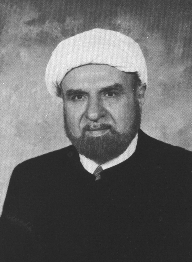Inquiries about Islam

 |  |
| Imam Chirri | Dr. Wilson |
Imam Mohamad Jawad Chirri, the author, and Dr. Wilson H. Guertin who directed to the Imam the questions which are
recorded in this book.
Mohamad Jawad Chirri
Mohamad Jawad Chirri is a native of Lebanon and a graduate of the distinguished religious institute of Najaf, in Iraq. He
is a theologian and lecturer. The Islamic Community invited him to Detroit, Michigan, in 1949. Imam Chirri is the director
and spiritual leader of the Islamic Center of America, 15571 Joy Road, Detroit, Michigan 48228.
His work extends far enough to include West Africa and the Middle East. Two important Islamic schools of thought had
been in disagreement and dispute for centuries. While on a lecture tour of West Africa and the Middle East, in 1959,
Imam Chirri called upon the head of the Sunni school, Sheikh Al-Azhar in Cairo, to recognize the other school.
In response to Imam Chirri's call, the majority leader issued a historical declaration which stated that the teachings of both
schools are equally sound, and that Muslims have the right to choose either one.
Preface by the author
Dr. Wilson H. Guertin is a scientist and an outstanding psychologist. In addition, he has a great deal of respect towards
religion and possesses a broad knowledge in theology. His interest in religion represents the interest of a scientist who thinks that religion, in general, contains some truth, in spite
of being clouded by man's misunderstanding and misinterpretation.
We can hardly expect a scientist, who deals with facts and tries to unveil the secrets of nature and life, to believe in a
religious teaching irreconcilable with the bare reality of nature, or with what had become an established scientific
knowledge. A scientist, faced with a religious teaching opposed to the bare facts of nature or to an established scientific
knowledge, is likely to take one of the following positions:
A. He may take a radical attitude by an outright rejection of religion in any form.
B. He may try to reconcile the religious concept with the established knowledge by interpreting the former in a way that
will not clash with the latter.
C. He may study other religions in order to find one that is not opposed to logic and to the facts of nature.
Dr. Guertin took the third position and tried to find the truth by conducting a religious research in many religious avenues .
His research was intensive. He examined many kinds of religious teachings, and finally came to examine the teaching of
Islam.
"I am a Christian by birth," he told me, "but ever since my early adulthood and extensive academic training, I have had
doubts. As a scientist, I am no longer able to accept any religious doctrine that is inconsistent with a scientific knowledge.
Having an inquisitive spirit, I tried to satisfy my doubt by looking into some religious teachings other than that of my own
denomination. I tried many religious avenues, but I was never able to satisfy my doubt.
"Finally, I read some literature about Islam, and that made me interested in acquiring more information about it. Now as I
come to you, I am hopeful that I will be able to have a better knowledge of your faith. I understand that you have a
profound knowledge of Islam, and that you are specialized in this field. I would like to conduct a research on Islam with
you, and I am confident that you will be able to answer my questions. "
The questions which he directed to me may come to the mind of any person who tries to find the truth in Islam and about
Islam. I thought, therefore, that those questions and their answers ought to be recorded and published, and that a book
containing our dialogues might be useful to any individual who has doubts and wants to find answers to pertinent
questions.
I know that a great number of people have similar problems, but they act indifferently. They keep their doubt and seek no
guidance. Some of them turn their back on the whole religious issue, while others remain within their respective
denominations with no earnest desire to seek the truth.
Distinguished, indeed, are those who feel thirsty for religious knowledge and energetic enough to try to quench their thirst.
This book is aimed to inform these seekers of truth and to satisfy the curiosity of anyone that may read it. If it should help
the reader to clarify his religious thought, if it should bring about a better understanding of Islam, and if it should create a
closer cooperation among the major religions, then the author would feel most gratified and extremely rewarded.
You can View the Book Contents at al-islam homepage
You can order this book online from Islamic Center of America
Copyright � 1965 by Imam Mohamad Jawad Chirri Second Edition, 1979, Third Edition, 1980, Revised Edition
Copyright 1986 by Imam Mohamad Chirri All rights reserved
GO HOME

|
 Book Reviews
Book ReviewsAl-Sahifat Al-Sajjadiyya:
Inquiries about Islam:
Go Back Home
 Book Reviews
Book Reviews

